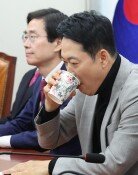[Opinion] `DJ Foreign Relations` Bill too Expensive
[Opinion] `DJ Foreign Relations` Bill too Expensive
Posted February. 14, 2002 09:18,
The Sunshine policy, which was the target of criticism domestically, came under fire from the outside and is creating problems between South Korea and the U.S. As the saying goes, `the bucket that leaks inside the house leaks outside as well` there does not seem to be anything left to salvage. The policy of `pouring everything` to the North was problematic, but so is the heavy-handed stance of the U.S.. But just because there is turbulence between South Korea and the U.S., it is not going to help anyone to get over-excited. With U.S. president George W. Bush`s South Korean visit coming up on the 19th, there is no need to think that we need to take care of every single issue by that time. Instead, it is more important to understand how the relationship between the two countries became so complex.
The Sunshine policy is responsible for the conflict between the U.S. and North Korea over the North`s weapons of mass destruction (WMD) spilling over into the South Korea-U.S. relations. The problem is that South Korea does not share the U.S.`s sense of urgency over NK`s ability to manufacture and transport nuclear, biological, and chemical weapons. The truth is that the SK government hung onto the Sunshine policy and did not want to take the threat of North Korean WMD as seriously as the U.S.. The distance between SK and the U.S. became greater after September 11 when nearly 5,000 people were killed in the terrorist attacks and the U.S. became greatly indignant. The U.S. is now determined to change the framework of international politics.
There are questions that we must ask ourselves at this point. First, are we fully tracking the development of North Korean WMD and the international avenues for exporting weapons? How much intelligence do we have that we can offer the U.S.? Second, are we reaching the goals of the NK policy on the level of exchange and cooperation? Are we realistically building mutual trust? Finally, does the Sunshine policy have the clear support of the people? And is the Sunshine policy thereby mobilizing support outside the country? If the answer is `yes` then there is no need to worry too much about the discord in the so-called fifty-year old `blood alliance` between SK and the U.S. because we can help the U.S. understand our perspective. Unfortunately, however, the answer to most of these questions is `no`. The logic of our position is also too weak to close the gap in perspective between South Korea and the U.S..
What, then, is the root of the problem? It is the President`s `South-North Foreign Relations Policy`. President Kim Dae-Jung has always pushed for the Sunshine policy and claimed that the policy had support whenever he visited foreign nations. What nation will oppose a rhetoric of exchange and reconciliation between SK and NK, including the U.S., China, Japan, and Russia who have direct interest in the security of the Korean peninsula? The reason, however, the U.S. still holds a different persective from South Korea is the North Korean WMD. In other words, the U.S. does not want the Sunshine policy to obscure the WMD threat. Furthermore, how would China, Russia, and Japan who are in close proximity with North Korea overlook the threat? There is good amount of evidence that China and the U.S. agree with one another on the issue of NK`s WMD. We will have to see how Mr. Bush will treat this issue when he visits China after South Korea.
President Kim may have paid attention only to the sunny side of the Sunshine policy and overlooked its shadow. The dissatisfaction with the Sunshine policy both at home and abroad were caused by the administration`s refusal to accept the undeniable realities that surfaced when it initially promoted the Sunshine policy. Even when we exclude the political and military issues and look solely on reunion of separated families and cooperative exchange, the North still refused to do things or make changes that the South expected. Although the differences that emerged between South and North Korea meant that the policy would take more time than expected, the administration kept on pushing ahead with unrealistic hopes and expectations. The President`s hasty expectations cannot hide the illusion behind them completely.
The President made the Sunshine policy the number one priority and this put pressure on the foreign affairs personnel and created unnecessary friction between South Korea and the U.S.. Who were they speaking for when they said, `The U.S. must refrain from making statements that would provoke North Korea` or `We need a strategy of persuasion in order to draw North Korea to the table?` American authorities responded by saying that this was `very counterproductive` and the SK-U.S. relations began to show signs of strain.
What did President Kim gain by promising that he would find a solution to the North Korea issue in his term and pursuing that goal with so much haste and such unrealistic expectations? The U.S. showed signs of discomfort with the content and speed of the North Korea policy on more than one occasion, but we did not foresee the coming crisis. We cannot see the U.S. as simply generous and magnanimous. What does the President intend to do with the North Korea policy now that the administration sweating to control the damage? Is this the image of the `Diplomat President?` One worries that now the President will go to the other extreme and put all his chips on cooperation and alliance with the U.S.. Will the outpouring of the sunshine be replaced by the outpouring of cooperation? President Kim is spending way too much money on the South-North relations.
kihang@donga.com







